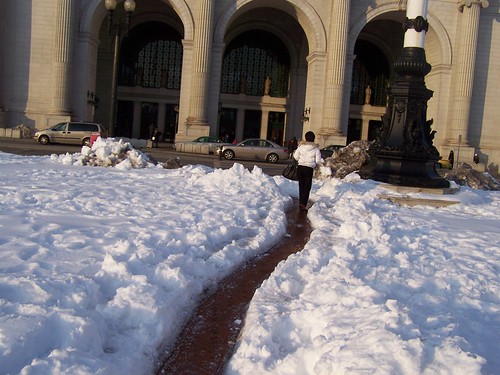Tax breaks, developers, etc. and Union Station, DC

Union Station, February 13th, 2010. Technically the land in front of the station is controlled by the National Park Service, not Union Station. But after controlling the property for 20+ years, don't you think they could have gotten around to forging a memorandum of understanding with regard to snow clearance on the plaza? Shouldn't the Union Station Redevelopment Corporation have taken the lead on this, given that their customers are the ones inconvenienced by the failure to have a maintenance of way plan for this space? (Also see "A "maintenance of way" agenda for the walking and transit city.")
A tax break for Union Station again is delayed, according to the local papers.
I don't think I ever got around to writing about how Boston Mayor Tom Menino is incensed by Vornado Trust's failure to go through the redevelopment of the Filene's Basement site in Boston, which is now a big hole (see "Menino threatens to oust Filene’s site developer" from the Boston Globe). From the article:
Menino told Vornado Realty Trust in a letter last night that the city will explore those actions after comments last week by its chairman, Steven Roth, convinced him the New York company is deliberately neglecting the Filene’s site so Boston officials will help finance construction.
“This development is too important to Downtown Crossing and to the entire City of Boston to be used as a bargaining chip to improve your bottom line,’’ Menino wrote.
The mayor was reacting to comments Roth made during a presentation at Columbia University that were reported in the New York Observer.
Roth was quoted as saying he sat on the former Alexander’s Department store in midtown Manhattan in the 1990s, allowing it become blighted in order to squeeze money out of public officials.
Vornado acquired the site after the store closed and, similar to the Filene’s site, left it half demolished before eventually building a glass skyscraper that now houses the Bloomberg financial news company.
“Why did I do nothing?’’ Roth said, according to the Observer. “The more the building was a blight; the more governments would want this to be redeveloped; the more help they would give us when the time came.’’
I mention this because it is somewhat relevant to the issue of providing tax breaks/incentives to developers-property owners in DC and specifically with regard to Union Station. From "Council chairman pulls measure cutting Union Station's tax bill" in the Washington Business Journal:
D.C. Councilman Jack Evans, D-Ward 2, sought to replace the roughly $3 million annual possessory interest levy with a payment in lieu of taxes totaling $10 million over five years — a $5 million savings. The PILOT would have lasted through 2015, according to budget language, at which point the station would be entirely tax exempt.
(This is from an earlier article on the same subject.)
The current owners of the lease claim that they can't afford to invest in the property because of the high taxes.
This is the case even though Union Station has one of the highest retail sales per square foot of any shopping center in the DC region (see "Retailing Success on Track; Union Station Is Among the Region's Top Performers" from the Post).
This is the case even though they paid $160 million for the lease, which has 81 years to go. See "Ground lease for Union Station changes hands" from the Washington Business Journal.
If high property taxes and a high demand for reinvestment into the property were an issue, the sales price of the lease should have been heavily discounted from the actual sales price. (E.g., with a house, if it's in bad shape, it sells for less than the normal market value for a house in fully usable condition.)
I am not against providing "incentives" to developers. It's the way the real estate business works.
Something that we forget in the city is that even though a place like Georgetown or Union Station is relatively well off compared to other commercial areas in the city (say Kennedy Street or Upper Georgia Avenue or H Street), these districts are competing with all other in-demand destinations within the region, including Arlington and Alexandria and Silver Spring and Bethesda and Reston. Tax incentives and other inducements help DC-based projects stay competitive within the region.
Even so, I think a relatively permanent tax holiday for Union Station is a bad deal for DC and it shouldn't go forward.
Maybe I'd feel differently if Union Station:
• would shovel the snow from in front of the station when it snows
• hadn't built a butt ugly parking garage on the back, instead of something somewhat attractive
• would not have fought for many years combining the intercity bus station into the train station for a truly intermodal facility
• would have developed a quality cultural interpretation plan for the facility, with quality information graphics.
If you get tax breaks, zoning variances, etc., it is supposed to come with some broader benefits to the public other than the bottom line of the property owner-controllers. Tax breaks, upzonings, variances, exceptions, etc. are supposed to be a two-way street.
I don't see that here, not yet.
Labels: commercial district revitalization, property tax assessment methodologies, public finance and spending, tax incentives



0 Comments:
Post a Comment
<< Home